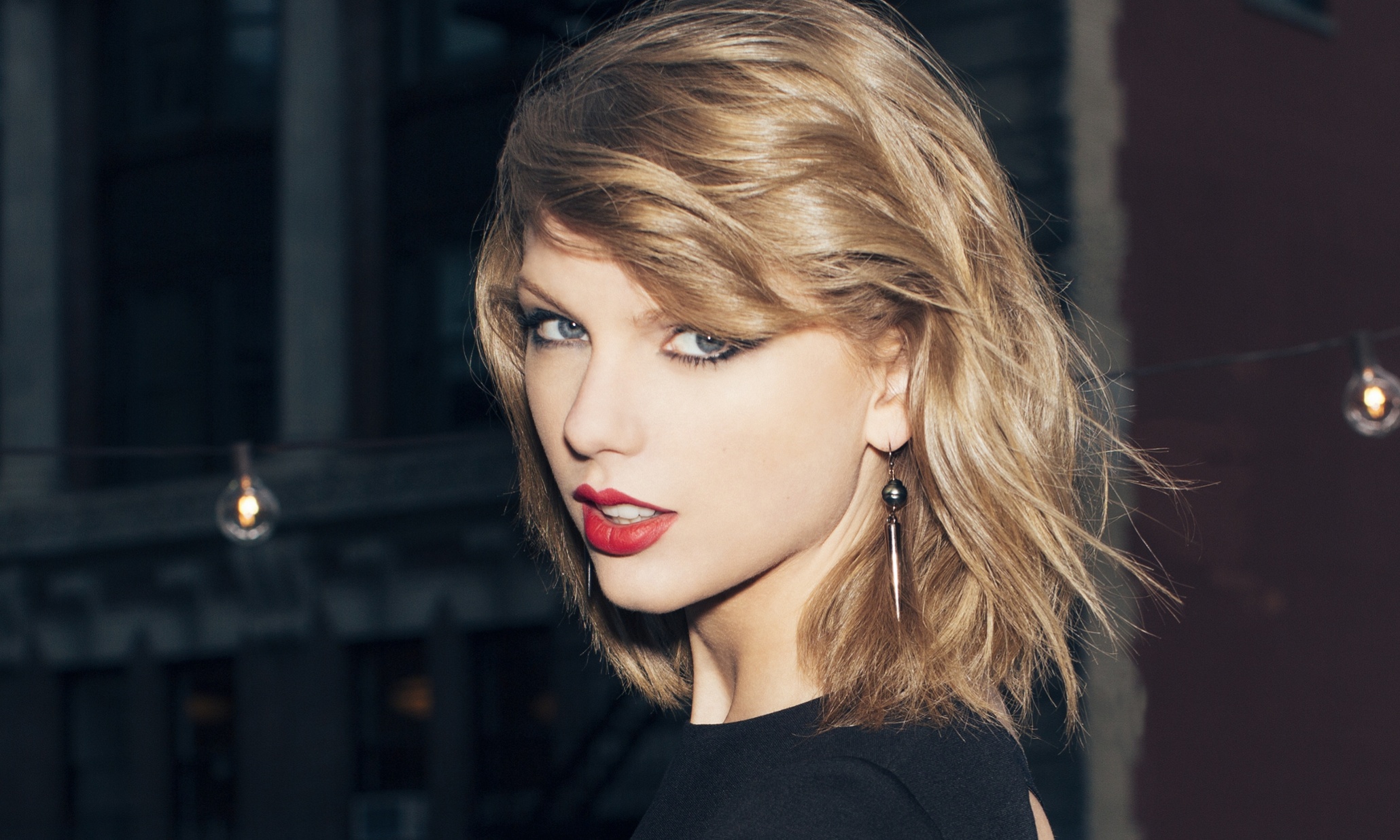It was surely the most interesting corporate tweet for quite some time. When Apple’s Eddy Cue – a senior vice-president at the largest publicly traded corporation in the world, no less – tweeted earlier this week, “We hear you @taylorswift13, Apple will always make sure that artists are paid”, it was not only an admission that the company had got its royalties policy for its new music-streaming service spectacularly wrong. It was confirmation, too, that Taylor Swift had, at 25, become one of the most powerful women in music.
That’s an incredible state of affairs, given her self-titled debut album in 2006 was the kind of teenage country-music record that are 10-a-penny in Nashville. Nine years and four albums later, her current release 1989’s enthralling mix of breezy 21st-century pop and autobiographical songwriting has now sold nearly nine million copies worldwide. No wonder Apple Music needed her onside.
Yes, a Swift-less Apple Music would have left a gaping hole in a service promising “all the music you could ever want”. But Apple was worried because Swift also has influence – Bloomberg Businessweek’s memorable headline from November last year ran “Taylor Swift is the music industry”.
When her Tumblr post entitled “To Apple, Love Taylor” explained the reasons behind holding back 1989 from Apple Music, she called the company’s decision to not pay royalties to artists during a three-month trial period “shocking, disappointing, and completely unlike this historically progressive and generous company”. But the well-thought-out statement was clearly not just an outburst from a singer-songwriter already worth an estimated US$200 million (Dh735m). Particularly when she continued: “This is about the new artist or band that has just released their first single and will not be paid for its success… [and] these are the echoed sentiments of every artist, writer and producer in my social circles who are afraid to speak up publicly because we admire and respect Apple so much.”
Those social circles include Ed Sheeran, Lena Dunham, Lorde and, as The Guardian noted late last year, “pretty much any smart and interesting young woman in the public eye”. Oh, and the small matter of her 59 million followers on Twitter. All of whom – including Apple – know that Swift is in the enviable position of having the wealth to be able to take a stand.
In November, she removed all her records from Spotify, the popular and successful music-streaming service that Apple hopes to usurp. It was potentially a huge gamble given 75 million people across the globe use Spotify to listen to music. But her rationale was clear. “I’m not willing to contribute my life’s work to an experiment that I don’t feel fairly compensates the writers, producers, artists, and creators of this music,” she told Yahoo Music.
The telling line in that statement was the description of her music career as her “life’s work”. Because, for all the laudable campaigning and philanthropic work she undertakes – she’s given $4 million to fund a new education centre in Nashville, promotes children’s literacy and is a vocal supporter of hundreds of charities – it can easily be overlooked that she’s written and produced some of the most interesting, polished and downright fun pop records of recent times.
But then even from an incredibly young age, Swift has been very much in control of her career. Begging her mother to take her on 1,300-kilometre road trips to Nashville from their Pennsylvania home as an 11-year-old, by 14, she’d convinced her father to transfer to the Nashville office of Merrill Lynch, after record company RCA offered her a development deal. Incredibly, she then walked away from the biggest record label in country music when they said they were unlikely to release any of her music until she was 18.
“I mean, I was 14,” she told The Daily Telegraph in 2009. “I genuinely felt that I was running out of time. I’d written all these songs and I wanted to capture these years of my life on an album while they still represented what I was going through.”
She did that on her debut, eponymous album. Listen to first single Tim McGraw now, with its soft 12-string acoustic, fiddle and homely story of a summer romance coming to an end, and it’s not difficult to see why the country music scene immediately took the 16-year-old to their hearts in 2006.
With hindsight, it was the other singles that really set the Swift template. Our Song still boasts all the country tropes, but is defiantly pop in outlook, celebrated at the time by Rolling Stone as a combination of Britney Spears and Patsy Cline. Picture To Burn, with its indignant chorus (“I hate that stupid old pickup truck/ You never let me drive/ You’re a redneck heartbreak/ Who’s really bad at lying”) was a sassy, tongue-in-cheek feminist anthem.
She told MTV years later that writing Taylor Swift was like “recording your diary over the years, and that’s a gift”. Not only to her, but the millions of young girls who quickly identified with this effortlessly normal, ringleted teenager who wrote her own songs and wanted the world to hear them. Not least because, unlike most country music artists, Swift used the then-ubiquitous MySpace to reach them – ironic, given her later stance on streaming music. All of which meant Taylor Swift was a slow burner, but by the time she was competing for best new artist Grammy with Amy Winehouse in 2008, she’d already sold enough records to make the follow-up eagerly anticipated.
Musicians who enjoy spectacular success so young are damned to hyperbole, but there was something very true in New York magazine’s assertion that in so “captivatingly nailing everything that is awesome and awful about coming of age” the musician with which she bore the most comparison was The Beach Boys’ Brian Wilson. By this point, her second album, Fearless, was already alerting people beyond the country-music firmament that Swift had something about her – not least when a track from it, You Belong with Me, beat Beyonce’s Single Ladies (Put a Ring on It) to the MTV Video Music Award for Best Female Video in 2009.
It wasn’t so much that Swift was the first country-music artist to win the accolade that proved how far, and how quickly, America had fallen in love with her. It was the reaction to Kanye West interrupting her acceptance speech on live television. Stars such as Pink, Janet Jackson and Katy Perry (who Swift would later fall out with) came out in her defence, and when the president of the United States was caught on tape calling West a “jackass”, Swift had moved on to an entirely new level of celebrity fame.
Which, naturally, has its pitfalls. Her love life – Swift has had a string of public and short-lived relationships with the likes of Jake Gyllenhaal and One Direction’s Harry Styles – has been scrutinised and mocked in a way male artists seldom have to endure. And when she writes about those romances in her songs, as every artist has done over the years, she’s often criticised for being bitter.
But Swift has taken on the critics head on in her lyrics – her 2014 single Shake It Off has the lines: “I go on too many dates/ But I can’t make them stay / At least, that’s what people say.” And one of the many reasons she continues to enjoy such acclaim is that she changes the narrative about women “unlucky” in love. As she said last year, 1989, from which Shake It Off is taken, doesn’t have jilted, pining songs about lost love. It’s about going “out into the world and making changes in your life on your own terms, friends on your own terms”.
There is little, musically, connecting Shake It Off with Tim McGraw. But because Swift appears to have stayed essentially the same person she’s always been, the progression to global superstar has been effortless. No major rock-star meltdowns here, just a genuine love for her fans and the music.
Not everything she touches turns to gold – the “feud” with Katy Perry, which began over hiring dancers for an arena tour, is ridiculous, and some concert photographers have taken issue with her image-rights policy. But generally, there’s no “image” to speak of, she believes in the songs she writes and, increasingly, they’re about empowerment and womanhood – without resorting to cliché or bashing everyone over the head with warrior feminism.
Perhaps the moment “Country Taylor Swift” crossed over into bone fide “Pop Star Taylor Swift” exemplifies her allure. Her first American Billboard No 1, 2012’s We Are Never Ever Getting Back Together, has all the narrative smarts that define country music, but at the same time is defiantly, effervescently pop. It’s a fun break-up song, one that celebrates the power of friendship and laughs at try-hard men.
In the video, Swift jumps around in pyjamas. Her band are in animal suits. It’s quite amusing to think that the same person now influences Apple policy. That’ll be, as Time magazine put it on their cover in November, “The power of Taylor Swift”.


